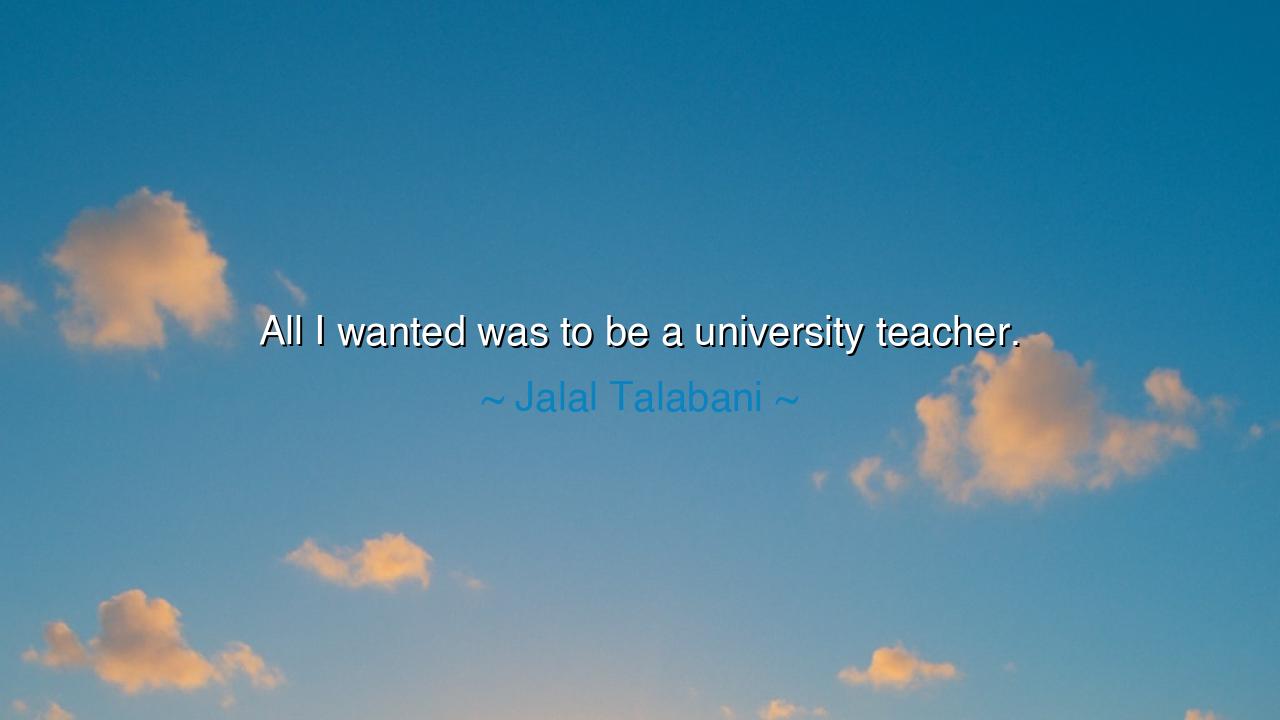
All I wanted was to be a university teacher.






“All I wanted was to be a university teacher.” So spoke Jalal Talabani, a man who would one day rise to be the President of Iraq, yet who confessed that his heart’s truest desire was not power, not armies, not crowns, but the simple and noble vocation of teaching. In this statement lies a paradox both humbling and profound: that those destined for greatness often yearn for the quiet labor of shaping minds, and that the calling of the teacher is no less heroic than the calling of the ruler.
The words reveal the purity of ambition. For to wish to be a university teacher is to wish not for dominion over lands, but for dominion over ignorance; not to command soldiers, but to awaken thinkers; not to conquer nations, but to cultivate wisdom. Talabani, though thrust by history into the turmoil of politics and the heavy burdens of leadership, looked back with longing at the path of knowledge, at the halls of learning where the weapons are books and the victories are the flowering of thought in young souls.
History too provides us with noble parallels. Consider Marcus Aurelius, emperor of Rome, who bore the crushing weight of empire and war, yet who longed for the life of philosophy. His Meditations were written not for the glory of conquest, but as lessons to himself, as though he were a student sitting at the feet of wisdom. Like Talabani, he understood that the greatest joy is not in ruling men, but in teaching oneself and others to live with virtue. What both men reveal is this: that to be a teacher is the higher crown, for rulers pass away, but the influence of teachers endures across centuries.
The quote also reminds us that the path of destiny is not always the path of choice. Talabani desired the university, but history required of him the battlefield of politics. Yet even so, his heart as a teacher shaped his leadership. For the wise leader must first be an instructor: patient, clear, and willing to repeat lessons until the student—or the nation—learns. The spirit of the classroom can guide the spirit of governance, for both require faith in the possibility of growth and change.
And what is the deeper lesson for us? It is that greatness is not measured by how high one climbs, but by how faithfully one honors the call within. If your heart longs to teach, even if life carries you elsewhere, let that spirit remain. Carry the patience of the classroom into your workplace, your family, your community. Be the one who explains instead of commands, who guides instead of scorns, who builds instead of destroys. For in truth, every soul you touch with wisdom becomes your pupil, whether or not you wear the title of professor.
Therefore, dear listener, cherish the noble calling of the teacher. Do not think it small, nor believe that power or wealth surpass it. A ruler governs for a season, but a teacher shapes eternity. If you are a teacher, honor your work with humility and passion. If you are not, then find moments to teach—mentor the young, share your knowledge, light a candle of understanding where there is darkness. These are acts of eternal worth.
Thus, from the heart of Jalal Talabani comes a truth that outshines politics: that the highest aspiration is not to rule, but to teach. His longing is an echo of all wise souls before him, who knew that to awaken another mind is the greatest of victories. Let this be your inheritance: to live as a teacher, whether in universities or in life itself, for in doing so you join the timeless company of those who shape the destiny of humankind not with swords, but with truth.






AAdministratorAdministrator
Welcome, honored guests. Please leave a comment, we will respond soon